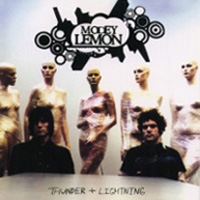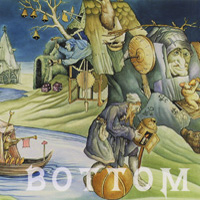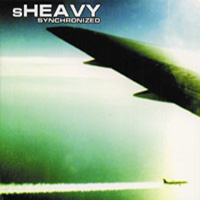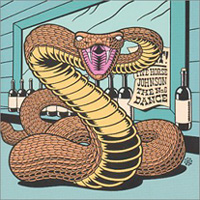 Five Horse Johnson
Five Horse Johnson
The No. 6 Dance (Small Stone)
An interview with singer Eric Oblander
by Brian Varney
Five Horse Johnson hail from Toledo, Ohio, and they exist firmly within the same continuum that brought forth such Ohio originals as Iggy Pop, Dead Boys, James Gang, Hudepohl, and Hustler. These are hallowed institutions, I realize, but judge not until you’ve experienced the majestic sleaze of Five Horse Johnson, whether live or on record. They’ve just released their fourth album, The No. 6 Dance, on the Small Stone imprint, and it’s a corker. This will, of course, come as no surprise to those already familiar with the band. For those not yet in the know, I will pause momentarily and allow you to atone for your sins.
So I called lead singer/harp man Eric Oblander to discuss things like Robin Trower, Led Zeppelin’s relation to the periodic table of the elements, and the unseen connection between Jimmy Page and Captain Beefheart. Despite nursing what sounded like a vicious hangover, Oblander had many interesting things to say. Read on.
What’s going on, man?
Not much. It’s been a pretty hard week of drinking.
How’s the reaction to The No. 6 Dance been?
Pretty good. It’s surprising, actually. The European press is really digging it. A lot of websites like Stonerrock.com and Roadburn really seem to be digging on it. People seem to be a little surprised that it’s a little heavier. And having some pretty intense heavy-hitters playing, like Jimmie Bones from the Kid Rock band, kinda surprised some people, too.
So you’re happy with the way it turned out?
I’m ecstatic with it. I think it sounds great! It’s a lot different than Fat Black Pussy Cat (1999), which is closer to what we sound like live, whereas The No. 6 Dance is more of a “rock album.” Some parts of it are really stripped-down, but there are more bells and whistles on it.
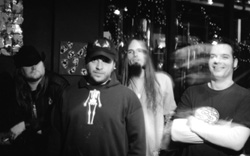 You mean having the keyboards and some of the weirder stuff on it?
You mean having the keyboards and some of the weirder stuff on it?
Yeah, and the second guitar…
Oh, that’s right, you’ve only got one guitarist… Which reminds me, are you guys changing drummers? I noticed The No. 6 Dance credits drumming to Mike Alonso and Chuck Mauk.
Yeah, Mike is the new drummer. He played on just a couple of the songs, and he’s the guy who’s been touring Europe with us. He was in Speedball from Detroit and he’s also in Bantam Rooster. The guy who played most of the album quit because he’s got a kid and he can’t really tour, so you can’t really blame him.
How was the European tour?
It was huge. We were totally shocked. We’d get about 100 people a night, lots of really good press, and we sold a lot of merch. We had people wanting autographs and stuff. We’ve already got another tour booked for August. We’re playing a lot of the bigger rooms next time. When we played the Paradiso in Amsterdam this time, we played in the smaller room, which holds 150-200 people. When we go back, they want us to play in the big room, which holds about 1,000 people. It’s cool, but it’s also kinda scary. If 100 people show up in a 1,000 seat room, that’s kind of embarrassing.
I’m curious about the song “Odella.” How did it come about? When I heard the version on The No. 6 Dance I just figured it was something you guys kinda made up on the spot, but I recently got a copy of your first album (1996’s Blues for Henry) and it’s on there as well.
That was actually the first song that Brad (Coffin, guitar) and I ever wrote together. We wrote it before we started playing live or anything. We were sitting in his basement, dicking around with riffs, watching the news and there was a story about this elderly guy who wandered off, and his wife’s name was Odella, so I wrote “Odella, where is your man tonight?” It’s a really slow, thick blues song because we were listening to a lot of Hendrix and molasses-y blues stuff when we wrote it, but people really like the version on the new album because they think it’s a stoner rock anthem or something.
But we actually wrote the song seven years ago. We’ve done 20-minute versions of that song live, where we don’t feel like stopping and we’re just spacing out. We actually quit playing it for awhile but we decided to throw it on this album and start playing it again because it gave us a chance to throw out some heavier stuff.
Where did you get the title of the new album?
It’s from Blazing Saddles. It’s just a little part in the movie, but we thought it sounded like a great album title. The sample at the beginning of the album is from Apocalypse Now.
It seems like you guys are assimilating the blues thing into what you do more and more. Double Down (1997) is a lot more of a straight blues album, whereas the newer stuff has the blues influence integrated into the rock format. How did you get into blues originally?
My Dad is a blues guy from way back. He used to hang out with the Butterfield Band and John Hammond and Bob Dylan and those kinda dudes, because he’s from Saginaw and he’d go hang out with them whenever they’d come through Chicago or Detroit. He and his brother had a blues rock band in the mid-’60s, so blues records have been around the house the whole time.
It was weird, because Brad and I were friends way before we were in a band together. In 1995, he went to Santa Fe to visit his Dad and ended up staying for about a year. While he was there, he picked up on the Fat Possum stuff and he was like, “Man, you’ve gotta check this out.” My Dad’s birthday came along and he really wanted to go to the Crossroads in Mississippi for his birthday, so we hopped in the van and went and tried to find those people. We went to R.L. Burnside’s house and Junior Kimbrough’s house and we went and saw them play in these little clubs. We met Frank Frost and Sam Carr and drove all over Mississippi. It was really cool.
So Brad was back in Santa Fe, listening to the Fat Possum stuff, and he started coming up with those kinda riffs. It was like breathing new life into our old life, back into blues. Because we’re basically all old punk rockers…
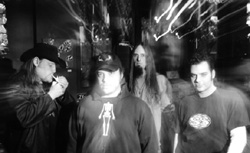 Really?
Really?
And metalheads. And the energy on that Fat Possum stuff is so raw, like hardcore or something. And it’s more about straight emotion and not necessarily physical talent so much as just some intangible thing.
So about that time we decided to start a band and have fun. When we started, we were basically just a blues band. As we went along, we started picking up on more and more rock stuff, so whatever we were listening to ended up, almost accidentally, being fused into what we were doing.
What kind of rock stuff?
Different stuff. Lots of Robin Trower and Motörhead, stuff that’s blues-based but still rock’n’roll.
What about ZZ Top?
Oh yeah, lots of ZZ Top, lots of Aerosmith, and stuff like Kyuss and other good stoner bands. When we did Double Down, which is kind of a psychedelic album, we’d been listening to lots of Trower and a bunch of that spaced-out, acid-head stuff. And since Greg from Raging Slab produced it, we listened to a lot of their stuff and started to get more into that slidey-rock sort of thing.
What sort of metal do you guys like?
Oh man, we’re like walking metalologists (laughs). I listen to Motörhead more than anything else, but they’re more of a rock’n’roll band than a metal band. When we were in Europe, we picked up on bands like Nile and all these insane, retardedly fast bands. I totally love Venom. We all love Venom, actually. We also like Discharge, which is punk but also has some of the roots of metal…
Do you like the Necros? They’re from up your way, aren’t they?
I roadied for them at one time. I toured with them and the Circle Jerks when I was in high school. Andy from the Necros was in my old band, Gone in 60 Seconds. The whole reason our band knows each other is because of the Necros. I never would’ve met anybody in this band or any of the guys in Big Chief if I hadn’t listened to the Necros.
What prompted a punker/metalhead like you to learn the harmonica?
My Dad taught me. What happened was I broke my foot several years back and I was stuck because I couldn’t work and I couldn’t drive because I had a cast up to my knee. My Dad gave me a bunch of CDs and bought me a couple of harps and said, “Here, play along. You can jam whenever you want.” It was something to do, so I started playing along to old blues CDs.
Then I’d sit in on open-mic nights and stuff. This was before we had the band… I played with Big Chief, too. I played on a record and live with them a lot when they were really at their peak. I’d be playing here in Toledo at a tiny bar on open-mic night in front of six people, and then the next night I’d go up to Detroit and play in front of 1,000 people at St. Andrew’s Hall with Big Chief. It was kinda weird, but it got me over the fear of playing an instrument live.
Did you play any instruments before the harmonica?
I drummed for a while, but I was the singer in Gone in 60 Seconds. I’d never had an instrument, I was just a front guy. It was kinda weird trying to pick up an instrument, especially since I do a lot of the soloing in Five Horse Johnson. I think the experience with Big Chief really helped me a lot. Luckily Brad and I worked out a lot by jamming. We used to rehearse every day.
Who are some singers that you like or have influenced you?
Rock singers?
Anyone.
I think the rock singers that influenced my singing the most are Robin Zander; he’s just got such full-blast power. I love Lemmy’s voice. I love Paul Rodgers from Free and Bad Company’s voice. Just really strong, cool, soulful rock voices that also have grit. As far as blues singers, probably Howlin’ Wolf and Captain Beefheart, who basically have the same voice. I love Muddy Waters’ voice. On a different level, I love Buddy Guy’s voice. It’s just really charged, you know? Those are the big ones, for me.
What about Tom Waits?
I love Tom Waits. He’s more of a smoky lounge guy, whereas someone like Beefheart is more… weird. Not that Waits isn’t weird, because he can be very weird, but Beefheart is just freaky.
So you’re a big Captain Beefheart fan?
Oh yeah. I’m not that much into Trout Mask because it’s kinda known as the “crazy” record, like (cheesy announcer voice) “If you wanna get crazy, get this record!” I’m more into ones like Spotlight Kid and Clear Spot. I also really dig Doc at the Radar Station and Unconditionally Guaranteed. It’s like a soul record, but all of a sudden there’s this sick funk-blues thing… And the lyrics are great. Him and Neil Young are two guys… You think you know how to write lyrics, and then you listen to those guys and you throw everything away… Especially Beefheart, because his lyrics are so fucked up. You listen to them and listen to them and then, all of a sudden, a year or two later you’re like, “I get it now! I understand what “Big Eyed Beans from Venus” means!”
I wouldn’t have made the Captain Beefheart connection.
Really? If you listen to “Spillin’ Fire” from The No. 6 Dance, we ripped Beefheart off pretty heavily on that one.
I have a hard time listening to the Beefheart stuff, just because of the angular time signatures and stuff. I don’t listen to much jazz.
Yeah, but Spotlight Kid and Clear Spot are just funk records. It’s definitely an acquired taste…
At the same time, you guys really like Zeppelin.
Oh yeah. That’s an obvious one. Barry from the Necros said – and I agree with him – that Beefheart and Jimmy Page are the two white guys who get actual blues the most. There are lots of white guys who are bluesy and get it, but he thinks those two are the ones who’ve mastered exactly what blues is, but with the volume cranked up to 10. The Zeppelin stuff is so free. There’s so much weird stuff, with strange time signatures and different parts of songs running into one another. Like on old Wolf records where there’s a part of a song with a rhumba beat and then it’ll turn into a straight country beat in the same song, that’s sort of what that Zeppelin stuff reminds me of. A lot of times, people just say (monster truck announcer voice) “The original heavy metal band!” And while they are heavier than Barium (laughs), they’re also really great at tapping into the blues thing.
A lot of people, my wife included, dismiss them solely because of Robert Plant’s voice.
Yeah, I know a ton of people like that, too. And while it’s hilarious and bad sometimes, it works perfectly. We also like a lot of bands from that same era, like Deep Purple and Black Sabbath and the first couple of Jethro Tull albums. But Sabbath and Zeppelin are probably the two bands we’ve thieved from the most. Not really on purpose, but that stuff just sticks in your gray matter and pops out later.
But it’s not like you guys are doing a bald-faced cop of those bands or anything.
Yeah, our stuff is a tip-of-the-hat to those bands, but it’s also definitely our own creation.
The strongest influence I hear on your sound is ZZ Top.
ZZ Top is definitely a huge influence. They’re up there with Zeppelin and Sabbath. The way the riffs come together is great, and Billy and Dusty are both great singers.
And Billy’s a really good guitar player.
He’s so underrated as a blues guitar player. You never hear people say “Billy Gibbons is one of the best guitar players around.” I really dig them a lot, but like Aerosmith, it’s unfortunate what happened to them. Those early records are still great. I’d say they’re probably Brad’s favorite rock band.
Mine too. People give me funny looks sometimes when I tell them that.
But that changes when you play them “Nasty Dogs and Funky Kings.”
(PO Box 02007 Detroit, MI 48202)

